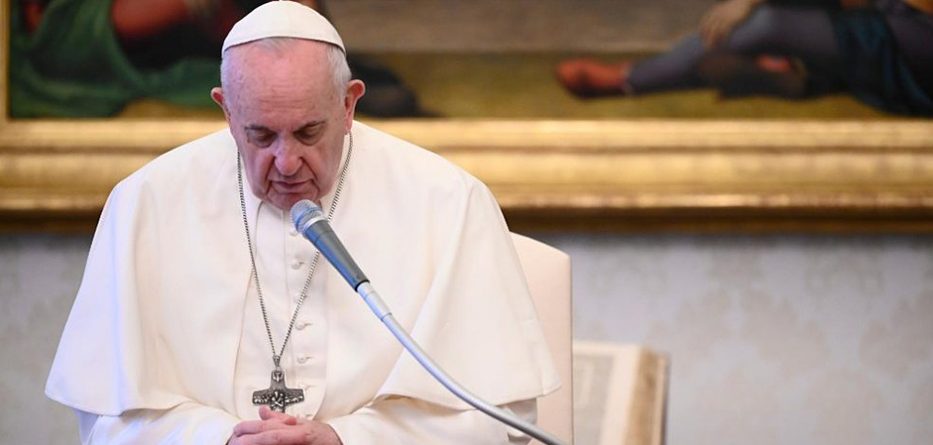
An independent commission established by French Catholic Bishops and religious has revealed that an estimated total of 330,000 people in France have been victims of sexual abuse within Church as children, and that between 2,900 and 3,200 priests and religious committed these crimes over a period of seventy years.
The Independent Commission on Sexual Abuse in the Church (CIASE) published its findings on Tuesday in a 2,500-page report after a two-and-a half-year investigation.
Sorrow for the victims and gratitude for their courage
Pope Francis learned “with pain” and sorrow of the report’s contents during the recent “ad limina” visit of the French bishops to Rome, the Director of the Holy See Press Office, Matteo Bruni, said following its release.
Speaking to journalists, Bruni emphasized that the Holy Father’s thoughts and prayers “go first of all to the victims” and their “wounds”. He added that Pope Francis is grateful to them for “their courage to speak out” and for “turning to the Church of France, so that, having become aware of this appalling reality and united to the suffering of the Lord for her most vulnerable children, she may take the path of redemption.”
“By his prayers the Pope entrusts the People of God who are in France, especially the victims, to the Lord so that He may grant them comfort and consolation and the miracle of healing, with justice,” Bruni concluded.
Enquiring into a number of historic sexual abuse claims
The CIASE was set up by the Bishops’ Conference of France (CEF) and the Conference of Religious Men and Women of France (CORREF) in 2018, in response to a growing number of historical sexual abuse claims.
Its task was to establish the facts regarding cases of paedophilia within the Catholic Church in France between 1950 al 2020, to understand why and how they occurred and how they were dealt with, to examine the Church’s action against paedophilia, and to make recommendations.
The Commission is presided by Jean-Marc Sauvé, a high ranking French official and former vice-president of the Council of State, who submitted the report on Tuesday to Archbishop Éric de Moulins-Beaufort of Rennes, Chairman of the CEF, and to Sister Véronique Margron, President of CORREF. A press conference, which was broadcast live by the French Catholic channel KTO on Tuesday morning, was also attended by representatives of the associations of victims.
The hearings
Mr Sauvé briefly introduced the conference referring to a letter from a victim acknowledging that the intense work carried out by the 21 members of the CIASE could be at times “destabilizing and discouraging”, but that it gave hope for a new start.
A member of the Commission, Alice Casagrande, a specialist in child protection issues, recounted the highly emotional atmosphere during the hearings, saying the members of the Commission were listeners rather than experts.
Speaking on behalf of survivors, François Devaux, an abuse victim of former parish priest, Bernard Preynat of Lyon, and co-founder of the association “La Parole Libérée” (“The Freed Word”), expressed his sense of “betrayal” in the face of the culture of silence and the “systemic dysfunctions” he faced in his struggle. He called for radical reforms in the Church, while thanking the Commission for its precious work.
330,000 estimated victims
While acknowledging that the report cannot be exhaustive, Mr Sauvé presented its contents, offering precise data which have been collected across different fields: including theology, medicine, sociology, anthropology, psychiatry or civil and canon law.
Most importantly, he said, the investigation helped establish contact with thousands of victims. CIASE has reported between 2,900 and 3,200 child sex predators holding positions within the Church since the 1950s.
However, according to the Commission, estimates are by default, as population surveys show an estimated total of 216,000 (with a margin of error of 50,000) people currently living in France who have been sexually assaulted by Catholic priests and religious, a third of whom have been raped. Adding assaults committed by lay people (especially in schools), this estimate rises to 330,000.
Urgent need for “vigorous actions”
Mr Sauvé said that overall, five and a half million people (14.5% of women and 6.4% of men) have been sexually assaulted before the age of 18 in France.
Close family and friends still remain the contexts with the highest prevalence of sexual violence, but they are immediately followed by the Catholic Church where most abuses (80%) concern boys.
CIASE’s chairman therefore called on the Church to pursue “vigorous actions”, by acknowledging past shortcomings (including the “law of silence”) and improving formation and vocational discernment as a way to prevent the phenomenon. He also warned against what he called an excessive “sacralisation” of priests.
45 Recommendations
The CIASE report presents 45 specific recommendations, including stronger internal control mechanisms, a clearer definition of the role of the bishop so to ensure an impartial examination of the cases and enhancing involvement of laypeople in Church governance.
Calling for a “work of truth, forgiveness and reconciliation”, Mr Sauvé undercored that the Catholic Church is “an essential component of society” and that it must work to “re-establish an alliance” with it.
“The Church can and must do everything to restore what has been damaged and rebuild what has been broken,” he concluded.
“Absolute shame”
Following Mr Sauve’s presentation, Archbishop de Moulins-Beaufort recognized the “appalling” scale of sexual abuse in the Church in France, and thanked the victims assuring his determination “to act with them”, and to change the attitudes of the Church authorities.
The CEF President promised that France’s Bishops would take the time to study the report and draw their conclusion during their plenary assembly in November.
For her part, the president of the Conference of Religious of France, Sister Véronique Margron, expressed her “infinite sorrow” and her “absolute shame” in the face of what she called “crimes against humanity.”
She noted that the 45 Recommendations represent a “demanding sign of confidence in the Church”, which will have to work with the other institutions.
Source: Vatican News





